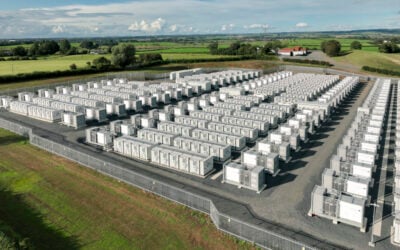
Developers looking to build new BESS facilities in Canada’s capital will have to adhere to stricter regulations, following the approval of amendments to the city’s planning and zoning laws by Ottawa’s Agriculture and Rural Affairs Committee during a recent meeting (23 January).
The report follows a December 2023 directive from Ottawa’s City Council requesting BESS facilities be included within the municipal review and approvals processes, with the recent amendments setting policy direction for new battery facilities sited within the City’s rural and urban areas.
Following approval by the Agriculture and Rural Affairs Committee, Ottawa’s Housing and Planning Committee will consider the report on 5 February, 2025, before it’s raised to the City Council on 12 February, 2025.
The report touches on several aspects, but focuses heavily on fire mitigation measures, which couldn’t be anymore topical for the BESS industry following the recent fire at Vistra’s Moss Landing battery storage complex in California.
Try Premium for just $1
- Full premium access for the first month at only $1
- Converts to an annual rate after 30 days unless cancelled
- Cancel anytime during the trial period
Premium Benefits
- Expert industry analysis and interviews
- Digital access to PV Tech Power journal
- Exclusive event discounts
Or get the full Premium subscription right away
Or continue reading this article for free
Emergency response planning as a priority
The report begins by recognising the complexity and uniqueness of BESS installations, recommending the addition of a new section to the City of Ottawa’s development guidelines, known as the Official Plan, specifically aimed at new battery storage facilities.
The new framework contains sets of guidelines for two categories of BESS facilities, referred to by the report as principal and accessory uses. In this instance, principal use is aimed at standalone front-of-the meter (FTM) battery storage projects and accessory use is directed at all behind-the-meter (BTM) battery projects, as well as BESS facilities co-located with an additional generative resource.
In creating the new framework, staff at Ottawa City Council consulted various advocacy groups and also the general public for their opinions on BESS facilities. Within the report, it was noted that the public had raised concerns over the safety of lithium-ion based facilities given “the history of BESS fire incidents in North America”.
Following the consultation, staff noted that “emergency response planning [would] be a priority in the review and approval of BESS as a principal use”.
Minimum setback of 150 metres from “sensitive land uses”
For BESS facilities categorised under principal use, the report recommends developers must obtain approval of the project from the local municipality through the issuance of a Municipal Support Resolution (MSR), as well as a separate zoning amendment.
Within their applications for an MSR and zoning amendment, the report recommends that developers include a minimum setback of 150 metres for BESS facilities from “sensitive land uses” such as residential buildings, places of worship, community centres and parks.
In creating this setback distance, and in the absence of any provincial guidelines, staff referred to Hydro One’s “BESS Fire Protection Risk & Response Assessment Standard”, published by the utility in November 2023 to address battery facilities located in close proximity to its high voltage transmission lines.
As part of the Hydro One standards, the utility established a setback of 150 metres from its highest voltage 500kV transmission lines for any BESS supporting the wider transmission grid.
”Effective fire and safety risk management”
As part of the zoning amendment application for BESS facilities categorised under principal use, developers must now also demonstrate to Ottawa Fire Services (OFS) that “effective fire and safety risk management” has been applied during the design of the project.
Developers will be required to install fire prevention and suppression systems, along with providing OFS with site-specific training. It’s proposed that each site will be assessed on a case-by-case basis to determine the appropriate water supply requirements in the event of a fire.
The report contains a set of fire mitigation measures developers must implement specific to three battery chemistries: lithium-ion, flooded lead-acid and valve regulated lead-acid.
BESS facilities categorised as an accessory permitted by-right
Under the new guidelines, BESS facilities categorised under accessory use will be permitted by-right in all areas as long as they adhere to zone-specific regulations. For agricultural areas, BESS facilities must not encompass more than 2% of the total lot area up to a maximum of 1 hectare.
For all non-residential zones, BESS facilities will be permitted if they don’t exceed 20% of the total lot area, and must have a minimum setback from any lot line of 10 metres. For BESS facilities located in residential zones, they must be enclosed within a building.
Under the new guidelines, co-located BESS facilities are treated under accessory use, and are subject to approval of the generative facility.
Evolugen in Ottawa for IESO procurement
As mentioned in the report, the Canadian operations arm of Brookfield Renewable, Evolugen, had two of its projects selected as part of the Independent Electricity System Operator’s (IESO’s) largest ever procurement, known as the Long-Term 1 Request for Proposals (LT1 RFP).
Evolugen is developing the two projects in Ottawa, dubbed Trailroad and Fitzroy BESS, alongside the Algonquins of Pikwakanagan First Nation which are expected to have 150MW and 250MW of storage capacity, respectively.
During the lead-up to project selection, developers were required to obtain support for the project’s from local municipalities through the issuance of an MSR, with supported projects receiving additional selection points. Although Ottawa City Council granted an MSR for the Trailroad project, it rejected an additional three, with Evolugen’s Fitzroy project proposed for the West Carleton-March area, included in the refusals.
According to a recent statement from West Carleton-March Councillor Clarke Kelly, Evolugen is currently undertaking survey work on various plots of land in the area to find the best spot for its Fitzroy project.





